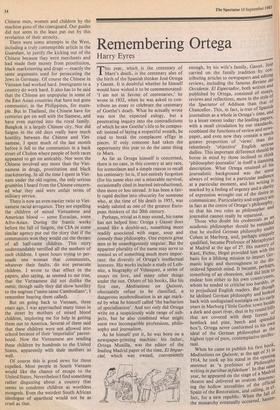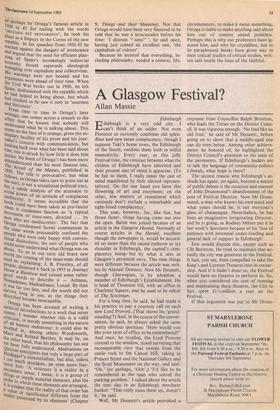Remembering Ortega
Harry Eyres
Thisyear, which is the centenary of Marx's death, is the centenary also of the birth of the Spanish thinker Jose Ortega y Gasset. It is doubtful whether he himself
would have wished it to be commemorated: 'I am not in favour of centenaries,' he wrote in 1932, when he was asked to con- tribute an essay to celebrate the centenary of Goethe's death. What he actually wrote was not the expected eulogy, but a penetrating inquiry into the contradictions of which he saw Goethe's life to be compos- ed: instead of laying a respectful wreath, he tried to break the complacent effigy in . pieces. If only someone had taken the opportunity this year to do the same thing to Marx.
As far as Ortega himself is concerned, there is no case, in this country at any rate, for iconoclasm and a simple reason to recall his centenary: he is, if not entirely forgotten (for his name ekes out a miserable survival, occasionally cited in learned introductions), then more or less unread. It has been a fair- ly rapid decline into obscurity for someone who, at the time of his death in 1955, was widely saluted as one of the greatest Euro- pean thinkers of the 20th century.
Perhaps, trivial as it may sound, his name has not helped him: Ortega y Gasset does sound like a double-act, something more readily associated with sugar, soup and comedy than philosophy. One expects great men to be unambiguously singular. But the apparent plurality of the name may serve to remind us of something much more impor- tant: the diversity of Ortega's intellectual interests. His works include a study of Leib- nitz, a biography of Velasquez, a series of
essays on love, and many other things under the sun. Others of his books, like his first one, Meditations on Quixote, obstinately refuse to be classified, a dangerous insubordination in an age mark- ed by what he himself called 'the barbarism of specialisation'. And not only did Ortega write on a suspiciously wide range of sub- jects, but he also combined what might seem two incompatible professions, philo- sophy and journalism.
As he himself put it, he was born on a newspaper-printing machine: his father, Ortega MuniIla, was the editor of the leading Madrid paper of the time, El Impar- cial, which was owned, conveniently enough, by his wife's family, Gasset. Jose carried on the family tradition by con- tributing articles to newspapers and editing reviews, including the famous Revista del Occidente. El Espectador, both written and published by Ortega, consisted of essays' reviews and reflections, more in the style of the Spectator of Addison than that .of Chancellor. This, in fact, is true of Spanish journalism as a whole in Ortega's time, and to a lesser extent today: the leading papers, with a small circulation by our standards, combined the functions of review and news" paper, and even now they contain a much greater proportion of 'views' than the relentlessly 'objective' English serious dailies. This important difference should be borne in mind by those inclined to think 'philosopher-journalist' in itself a daMniq description. What Ortega retained of his journalistic background was the sense always of writing for a particular audience .at a particular moment, and his writing is marked by a feeling of urgency and a clarity of expression wrought out of the desire to communicate. Particularity and urgency are in fact at the centre of Ortega's philosophY, so that his two roles as philosopher and journalist cannot really be separated. Those who doubt his credentials as an, academic philosopher should be reminded that he studied German philosophy under Cohen at Marburg, and, perhaps unicluelY qualified, became Professor of MetaphYslcs, at Madrid at the age of 27. His mastery 01 Kant, Fichte, Hegel provided him with the basis for a lifelong mission to impart Ger- manic logic and thoroughness to the dis- ordered Spanish mind. It became, perhapS, something of an obsession, and did little to endear him either to his own countrymen, whom he tended to criticise too harshlY, or to prejudiced English readers. But th0ugh. he idolised German philosophy and looked back with undisguised nostalgia on his earlY years in Marburg ('little Gothic town beside a dark and quiet river, shut in by round hills_ that are covered with deep forests. of hemlock and pine, beech and splendid box'), Ortega never conformed to his own ideal of the German philosopher as the highest type of pure, contemplative intellec- tual. When he came to publish his first book, Meditations on Quixote, at the age of 31. In 1914, he took up his stand in the opening sentence as 'a professor of PhilosophY writing in partibus infidelium'. In that salt?e year, he appeared on the stage of a Mackin theatre and delivered an oration denon. ing the hollow unrealities of the offleT Spain of the Restoration, and calling, in ef- fect, for a new republic. When the fall n' the monarchy eventually occurred, hasten-. ed Perhaps by Ortega's famous article in republic. In his speeches from 1931-33 he warned against the dangers of intolerance Place as a Deputy in the Cortes of the new and argued that the need for efficient plan- ning of Spain's increasingly industrial economy should supersede ideological wrangling over capitalism and collectivism. arguments were ahead of their time. When 1930 in El Sol ending with the words ‘DELENDA EST MONARQuiA', he took his His warnings were not heeded and his the Civil War broke out in 1936, he left Spain, disillusioned with the republic which he had helped to bring about, but which had resulted as he saw it only in 'sourness and bitterness'.
writings
effect that he knows that nobody will Jusnee. No book of Ortega's has been more understand what he is talking about. This seems on the face of it strange, given the ex- emplary lucidity of his prose and his jour- nalist's concern with communication, but 10.0king back over what has been said about !I'm, one is struck by how little it does him misunderstood than his most famous one, the start, is not a sensational political tract, but. a subtle analysis of the accession to social Power of an attitude of complacent mediocrity It seems incredible that the c1930. The title is provocative, but what follows, as Ortega takes care to point out at book could have been taken as pro-fascist When it condemns fascism as 'a typical Ortega condemned Soviet communism n could never understand what Ortega was on movement of mass-men, directed ... by men who are mediocrities'. The fact that the i People who were only happy
tional
about. To us in our tatty old brave new world the coming of the mass-man should need no explaining: J. B. Priestley, of all People, dissected it back in 1955 in Journey pod words to describe it — Admass, described long The R i lt vvas .Nomadmass, Hashadmass, Luxad. By then criticism, or merely something in the nature series of introductions to a work that never comes I wonder whether this is a valid ," all human endeavour: it could also be levelled at, among others Wordsworth, the other hand, that his philosophy has not Marx and Roland Barthes. It mO be, on Yet .hp. ?---Y1 luny understood. Meditations on secondary sense; I mean, it is a group of i ant much mistaken, an even more fear- some Ism: 'A structure is a reality in a things or simple material elements, plus the Order er . which these elements are arranged. reality possessed by its elements' (Chapter It s evident that the reality of that order has ..114.ocote anticipates not only a large part of
From e same wordspresumably confused the eidegger's existentialism, but also, unless Ortega has been accused of writing a i
value or significance different from the evolt of the Masses,, published n distinctions, the sort of people who a Rainbow and coined some rather far too late, and the words did not , one comes across a remark to the
time to time in Ortega's later became inescapable. in use, as the things they with conven- 9, Things and their Meaning). Not that Ortega would have been very flattered to be told that he was a structuralist before his time: 'I distrust "-isms" ', he said once, having just coined an excellent one, 'the capitalism of culture'.
Because he insisted that everything, in- cluding philosophy, needed a context, life, circumstances, to make it mean something, Ortega is liable to make anything said about him out of context sound pointless. Perhaps this is why our professors have ig- nored him, and why his crystalline, not to be paraphrased books have given way to their critical studies of critical studies, writ- ten safe inside the lines of the faithful.







































 Previous page
Previous page